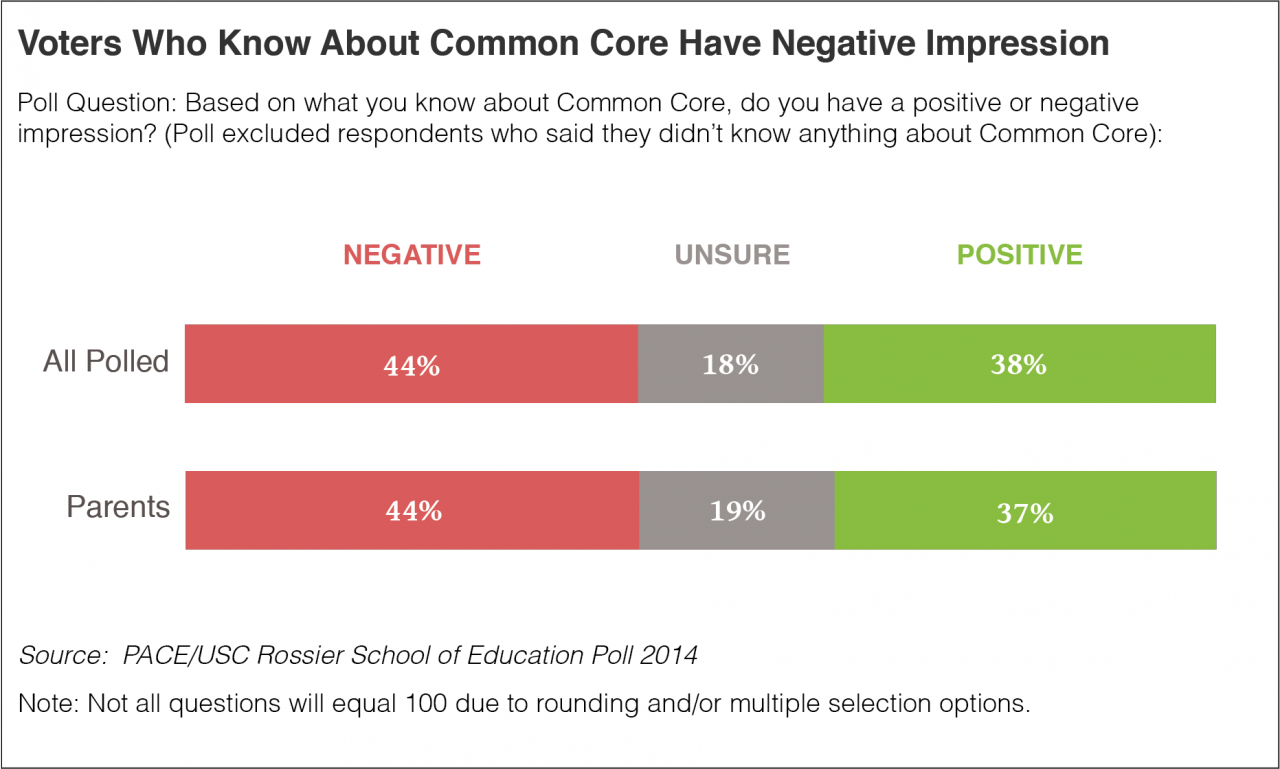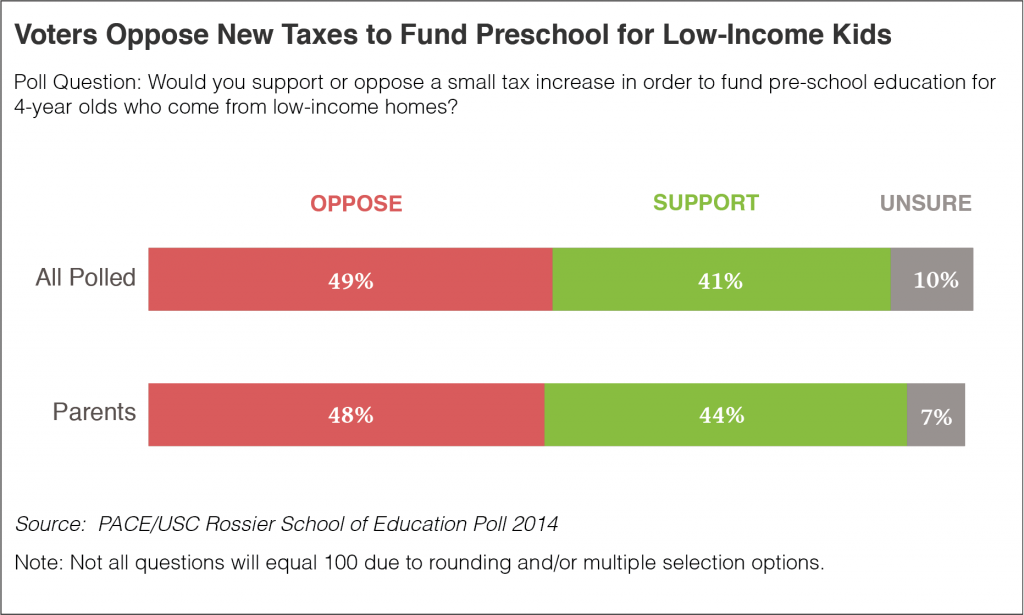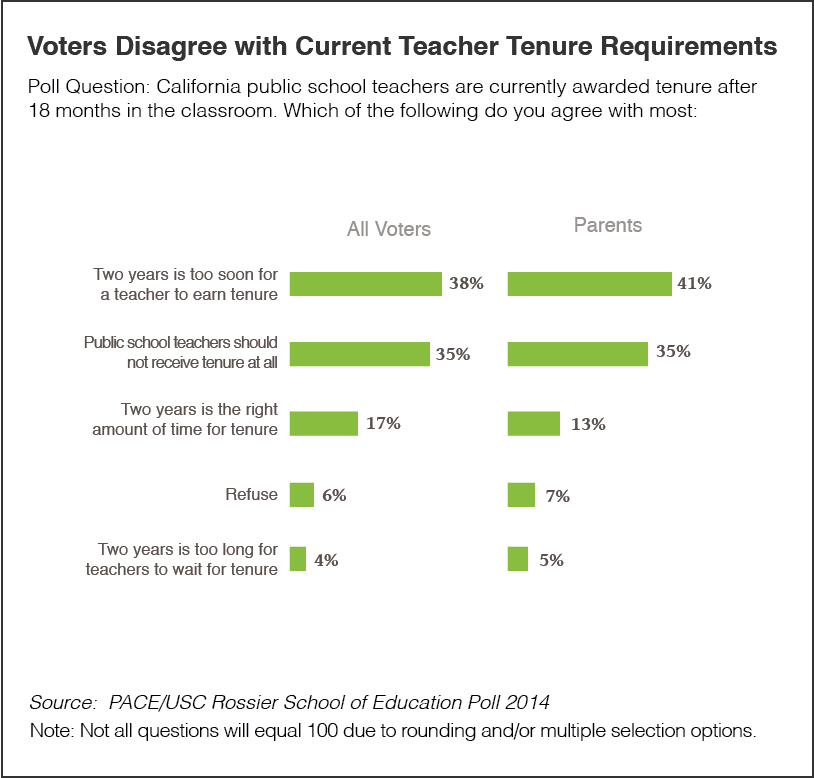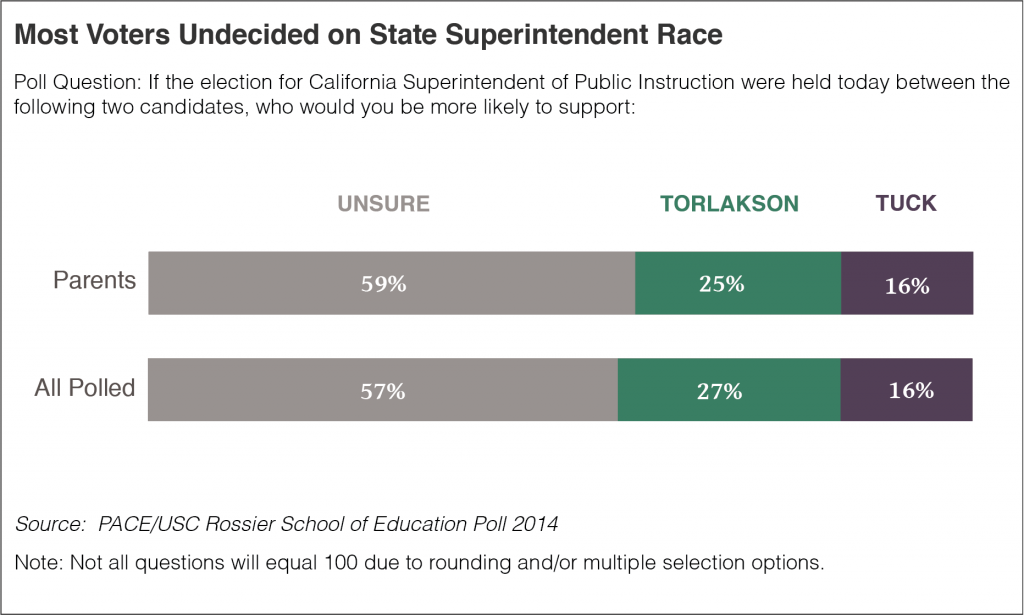By John Fensterwald |EdSource | http://bit.ly/1jrLsAC

Credit: John C. Osborn/EdSource Today
June 26, 2014 :: Here are some key results of the poll of Californians’ views on education conducted by the University of Southern California Rossier School of Education and Policy Analysis for California Education. For more details of the survey, see below.

An annual poll of Californians’ views on education contains bad news for teachers unions and advocates of the Common Core standards, good news for backers of charter schools, mixed news for preschool supporters and a warning for State Superintendent Tom Torlakson in his re-election campaign against Marshall Tuck.
The joint survey by the University of Southern California Rossier School of Education and the independent research organization Policy Analysis for California Education, or PACE, questioned 1,005 registered voters earlier this month about a range of education topics.
The poll indicated that some of the doubts and skepticism about the Common Core State Standards that have gained sway in other states are taking hold in California, too. As opposed to many states, in California the new standards in English language arts and math have the full support of the majority of the Legislature, the governor, the State Board of Education and organizations representing teachers unions, school boards and the state PTA.
But of the voters surveyed, the more they hear about Common Core, apparently the less they like it. Of the roughly three-quarters of voters who said they knew something about the standards, more had a “negative impression” (44 percent) than a “positive impression” (38 percent). Parents with kids in schools, who made up about 30 percent of those surveyed, had identical views.
“Republican opposition solidified, and Common Core has become a political litmus test for the national Republican Party, therefore, with some active politicking in California,” said David Plank, executive director of Policy Analysis for California Education.
When read two statements, one presenting the case for Common Core and one against (see below), 32 percent of parents and of all voters surveyed said they favored the standards, while 41 percent of all voters and 45 percent of parents said they opposed them. Last year, when that question was asked, 36 percent of respondents, including parents, said they supported the Common Core and only 25 percent were opposed.
At the same time, the percentage who said they knew at least a little about Common Core increased from 29 percent of respondents last year to 47 percent of all respondents and 58 percent of parents this year.
“The response is striking,” said Julie Marsh, an associate professor at USC’s School of Education, who attributed the rise in negativity toward Common Core to an increase in national media stories about states pulling out of the two consortia that are creating the standardized tests for the new standards. She also said there is opposition to immediately holding teachers and schools accountable for test results.
At the same time, Marsh said, there has not been a lot of media attention in California on Common Core. “That creates a messaging problem potentially for Common Core advocates and the state,” she said.
David Plank, executive director of PACE, sees politics at work.
“Republican opposition solidified, and Common Core has become a political litmus test for the national Republican Party, therefore, with some active politicking in California,” he said. “We education folks have been mostly talking to one another about this and have done much to raise public awareness about why it is good for California schools and kids.”
Other issues in the survey:
Tenure and unions: Earlier this month, in Vergara v. State of California, a Superior Court judge ruled five teacher protection state laws – providing tenure within two years, mandating layoffs by seniority and creating complex disciplinary procedures – violated the state Constitution because they disproportionately harmed low-income and minority children’s education.
Of the 40 percent of voters polled who said they knew of the decision, 62 percent said they agreed with the decision, while 23 percent disagreed. Among parents, 67 percent agreed and 18 percent disagreed.
In addition, 35 percent of parents and of all respondents said there shouldn’t be a tenure system, while 41 percent of parents and 35 percent of all voters said granting tenure within two years after a teacher is on the job is too short a time to evaluate competency.
Of those surveyed, 66 percent of parents disagreed with laying off teachers based on seniority, while 20 percent supported it (about the same percentages for all voters).
Funding preschool: The poll found 62 percent of respondents and 64 percent of parents supported using public funding for preschool for low-income 4-year-olds. However, asked whether they’d support “a small tax increase” to pay for it, only 41 percent overall and 44 percent of parents said yes, while 49 percent overall and 48 percent of parents opposed the idea.
Going Deeper
- Summary of USC Rossier School/PACE 2014 education poll, June 26, 2014
- 3-year trends, USC Rossier School/PACE 2014 education poll, June 26, 2014
- Details of how subgroups voted on questions, USC Rossier School/PACE 2014 education poll, June 26, 2014
Race for state superintendent: In the June primary, incumbent Torlakson soundly defeated Tuck, a former charter schools executive from Los Angeles, 47 to 29 percent in a three-way race for state superintendent. The poll, however, indicates that the head-to-head runoff election in November could be close.
Asked who they would vote for if the election were today, nearly 60 percent of parents and voters overall said they hadn’t made up their minds, with 27 percent overall favoring Torlakson and 16 percent for Tuck. Among parents, 25 percent favored Torlakson and 16 percent favored Tuck.
Asked again, once they had watched a campaign ad for Torlakson and one for Tuck, which has not been widely viewed, the race became a toss-up, close to within the poll’s 3.5 percent margin of error. Among all respondents, 38 percent backed Torlakson and 36 percent preferred Tuck, with 27 percent undecided. Among parents, more backed Tuck (40 percent) than Torlakson (35 percent), with 25 percent undecided.
Charter schools: About half of the respondents said they had a very good or somewhat good understanding of charter schools, with the rest little or no understanding. After they were read a paragraph objectively describing charters, 57 percent overall said the numbers of charter schools should be greatly or somewhat increased, with only 11 percent favoring fewer. Among parents, 63 percent favored more charters, with only 9 percent favoring fewer.
Participants in the poll were selected based on party affiliation, geographic location and ethnicity, and took the survey online. The results of underrepresented groups were given extra weight. This includes Hispanics, who make up 26 percent of registered voters but were 17 percent of the participants.
The arguments for and against Common Core in the poll are as follows:
- California is right to implement the Common Core State Standards because they provide
a clear, consistent understanding of what students are expected to learn, so teachers and parents know what they need to do to help them. These standards have been adopted by California and 45 other states. - California should not implement the Common Core State Standards because they represent a Washington, D.C.-based, one-size-fits-all approach that increases our reliance on standardized testing and does not take account of regional and classroom realities. Many states that have adopted the Common Core Standards are now re-evaluating their decision.


No comments:
Post a Comment